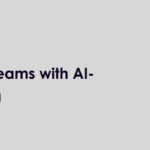Transforming EHCP Delivery: The EHCP Agency Report

Joining Agilisys has truly been a breath of fresh air. For the first time in a long while, I feel excited and inspired by the work I do. Being surrounded by a team of creative, driven individuals who are genuinely passionate about making a difference has reignited the spark I had when I first entered social work.
When I reflect on my previous role, I realise how much the endless paperwork and administrative pressures drained my enthusiasm. Social work, which once felt like a calling, started to feel like a mechanical routine. I was constantly behind, overwhelmed, and disconnected from the very reasons I chose this profession. In this environment, I have more space to breathe, to think, and most importantly, to be present in my work.
The more I have worked with our QuickAction platform and the Agilisys Needs Assessment tool that is a part of it, the more I have come to appreciate how transformative it truly is. There is something incredibly empowering about knowing that this tool was designed with social care workers in mind, built not just for us, but with us. The development team does not just see this as a product, they see it as a way to change the landscape of social care for the better.
As I have worked alongside the developers, it has been clear that they genuinely care about making a difference. The feedback has been so positive; they listen, adapt, and improve the tool based on my real experiences of being a frontline worker and completing needs assessments. You can feel the passion behind their work. This is not just another piece of technology, it is a tool born out of a genuine desire to lift the administrative burden that so many social care workers face.
For so long, the narrative around social care has been that we are drowning in paperwork, just trying to keep our heads above water. This tool has completely shifted that perspective for me. It is not about being weighed down by admin, it is about streamlining our processes so we can focus on the most important part of our job, which is to support and advocate for those in need of care and assistance.
One of the things that stands out to me the most is how the tool has been developed with a lot of involvement from social care workers. There is a real sense of partnership between the team and those of us who will be using the tool. The team shadowed social care workers in local authorities across the country, from Wigan to North Somerset, to gain a real understanding of the experiences of people utilising the tool. The ongoing discussions with councils have ensured that the tool captures the true essence of social work, the language, the approach, the values. It is not a generic tool, it is one that truly understands.
I can honestly say that I have never felt more connected to a project. The team have worked tirelessly to ensure that the tool reflects the person-centred, strengths-based approaches that we use in our day-to-day practice. An example of this is the language used to ensure that the person’s voice is heard, and they are at the centre of each assessment. They have listened, adapted, and continuously refined the tool to make sure it fits into our work, rather than us having to adjust to a rigid system. It is personalised to the needs of a council so it can seamlessly fit into the working patterns and behaviours of council staff. This has been a collaborative, deeply respectful process, and has been a huge part of why this tool feels so right.
The training for the tool was an experience in itself. The team were not just experts in the tool, but also in understanding the daily challenges that social care workers face. There was no question too small or too complicated. They answered everything with such patience, clarity, and genuine care.
When I first trialled the tool, I thought it might be too good to be true. But having used it, I can honestly say it is a game-changer. From start to finish, using the tool was an easy, efficient experience. I would go to the App, press record and be present in the assessment, without having to worry about taking endless notes. It captured the emotions, risks, and key points from assessments in a way that felt natural and thorough. If I had this tool during my years as a practitioner, I would have had so much more time to focus on what really matters.
This tool does not just reduce admin, it restores the heart of social work. It allows us to focus on the human side of our job, while also making the process of documentation smoother and more manageable. It would give me the freedom to feel less stressed, more in control, and most importantly, more present in my role.
This is not just a tool, it is a revolution in the way we approach social care. I know it is going to continue to transform the way we work for years to come.


